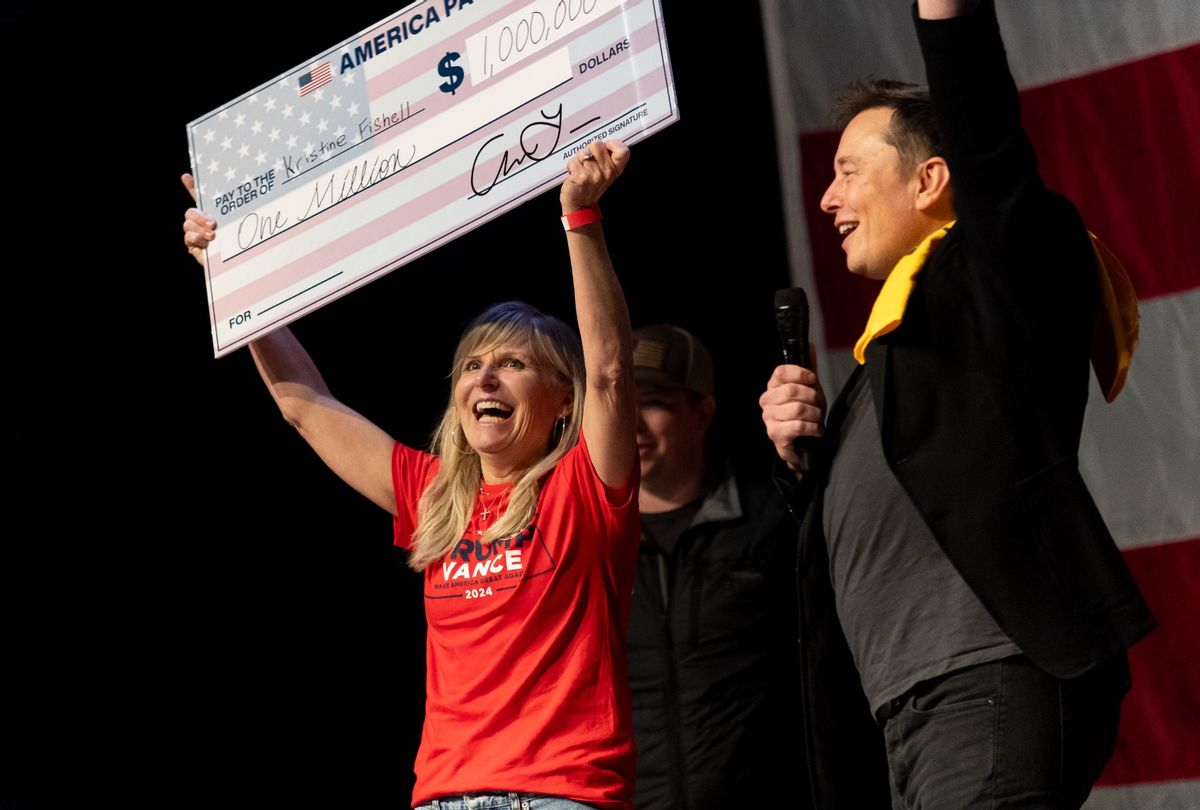Are there rules for billionaires that they must follow like anyone else, or does Elon Musk experience life beyond the reach of mere human campaign finance law?
According to 52 U.S.C. § 10307(c), anyone who “pays or offers to pay” someone “either for registration to vote or for voting shall be fined not more than $10,000 or imprisoned no more than five years, or both.”
Now consider that the CEO of Tesla and X is offering to pay $1 million (and give free admission to hear him talk) to swing-state registered voters who hand their personal information over to America PAC, the political action committee he founded to support former President Donald Trump. Musk, a Pentagon contractor who has already sunk at least $75 million into his campaign for the Republican nominee, who has in turn promised him a government job should he win in November, has also been paying people $47 for every other person they get to hand over their information.
“We are aware of nothing like this in modern political history,” a group of former Republican officials, including some who worked for Presidents Ronald Reagan and George W. Bush, wrote in a letter to U.S. Attorney General Merrick Garland and Pennsylvania Attorney General Michelle Henry. Dated Oct. 21, the letter, obtained by The Washington Post, calls for a law enforcement response to Musk’s get-out-the-vote scheme. “We urge you to investigate whether America PAC’s payments are prohibited payments for voter registration," the letter states, with the signatories — including former New Jersey Gov. Christine Todd Whitman and Trevor Potter, former chairman of the Federal Election Commission — pointing to a critical analysis by UCLA law professor Richard L. Hansen, who describes the giveaway as “clearly illegal.”
The wiggle room is this: Musk’s payments are framed not as reimbursement for voting, or registering to vote, but as a reward for signing a “petition” drafted by someone who was barely trying: “By signing below, I am pledging my support for the First and Second Amendments,” it states. But the only people eligible for a monetary reward are those who are “registered voters in Pennsylvania, Nevada, Arizona, Michigan, Wisconsin and North Carolina.” The offer expired Oct. 21, according to the website.
The defense, then, is that Musk is not paying people to register to vote — no, he is paying people who have already registered to vote in exchange for their signing up with the Trump campaign, or at least the arm of it run by a South African billionaire.
The nefarious genius of the plan should not be overstated: It’s not clear that this is actually a good use of the billionaire’s money, just as his paying people to canvas for Trump is generally viewed as less effective than having motivated volunteers do the same thing for free (the latter are less inclined to fake the work). According to Politico, the first two people who won the $1 million prize were Republicans who had already voted by mail, with one woman’s Trump-Vance campaign merchandise suggesting her mind had long since been made up (Musk, who previously cast absentee ballots himself, has since adopted Trump’s baseless claims of fraud and termed mail-in voting “insane”).
We need your help to stay independent
Still, “arguably ineffective” is not the same as “completely above board, legally.” That someone must be a registered voter to receive Musk’s prize is, to be sure, an incentive for someone who isn’t already registered to get on that and do so.
“To facilitate that, the petition webpage includes links to voter registration websites for each of the seven [swing] states, directly alongside the offer of payment,” the ex-GOP officials note. Musk may be playing cute by tying the prize to a vacuous petition, but “critically, America PAC has not made the names of or numbers of petition signers public — so the petition provides no demonstration of public support.”
Bruce Castor, who represented Trump during his second impeachment trial, said even he could not defend Musk’s latest intervention in the presidential race. Castor noted that Musk could be running afoul of both state and federal laws by essentially running a lottery, which is itself “a backdoor way of paying people, at least with a chance of renumeration, if they register.”
“I don’t think it’s a good idea and I would hope Mr. Musk would reconsider doing these sorts of things,” he told NewsNation. “It doesn’t look good. I think it has a bad vibe about it.”
Read more
about the 2024 campaign



Shares